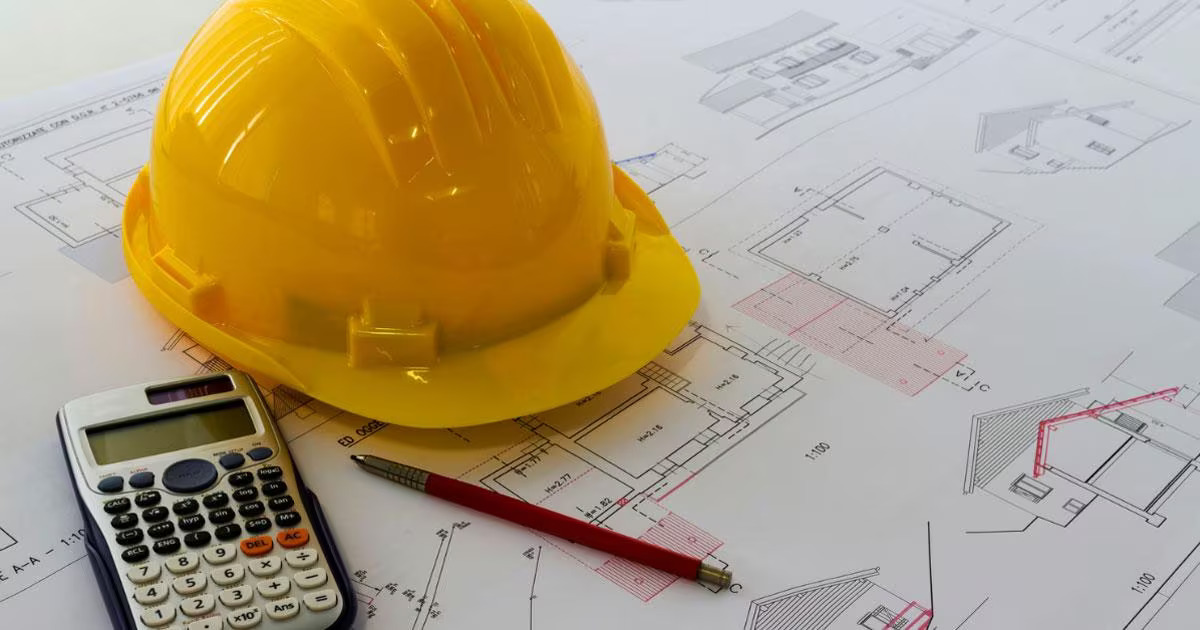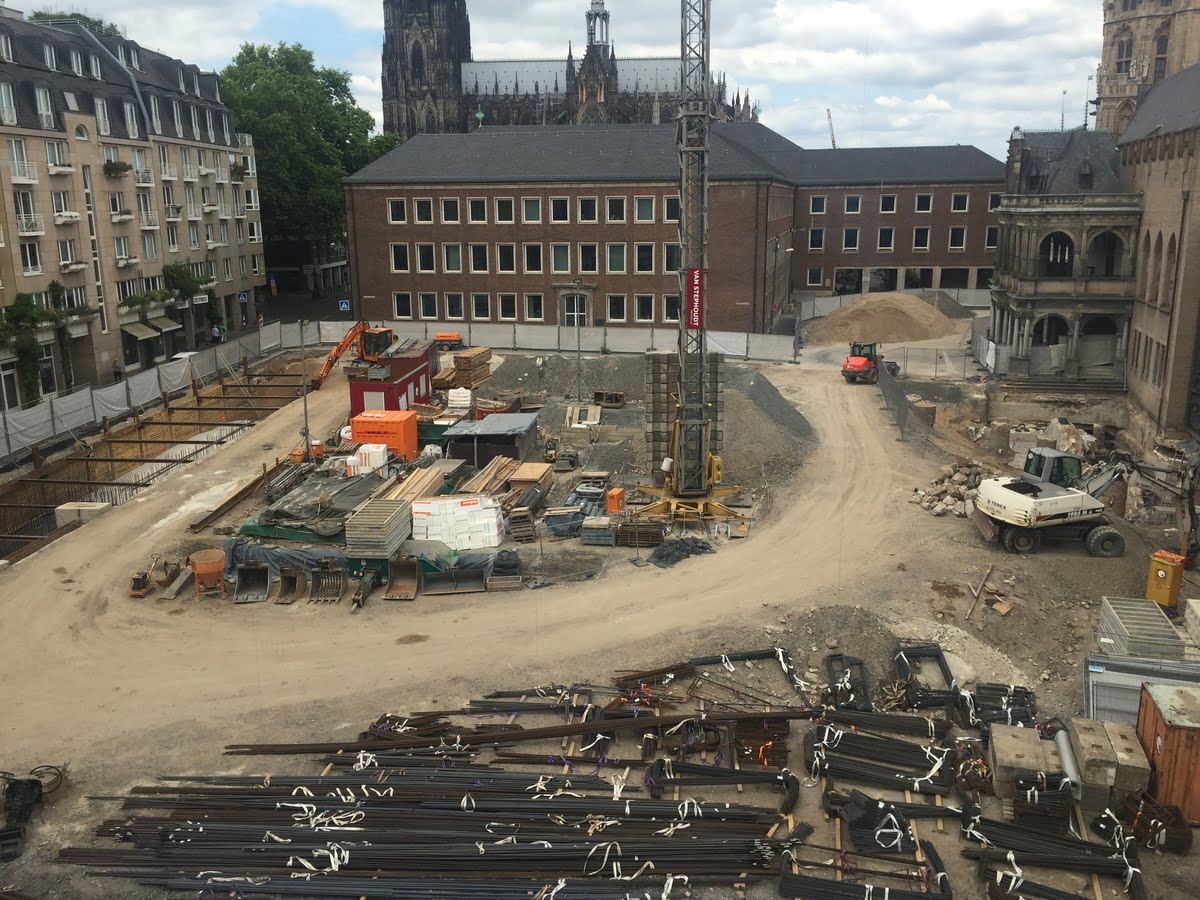Home>diy>Building & Construction>What Is A Construction Business


Building & Construction
What Is A Construction Business
Modified: January 24, 2024
Discover the ins and outs of a building construction business and learn how to start your own. Gain insights on permits, costs, and project management.
(Many of the links in this article redirect to a specific reviewed product. Your purchase of these products through affiliate links helps to generate commission for Storables.com, at no extra cost. Learn more)
Introduction
Welcome to the world of construction businesses, where dreams become reality and buildings reach for the skies. The construction industry plays a vital role in shaping our modern cities, towns, and infrastructure. From towering skyscrapers to humble homes, every structure is a testament to the craftsmanship and skill of construction professionals.
But what exactly is a construction business? In simple terms, it is an enterprise that specializes in the planning, design, construction, and renovation of buildings and infrastructure. These businesses range from small-scale contractors to large construction firms, with each one contributing to the growth and development of the built environment.
Construction businesses are involved in a wide array of projects, ranging from residential and commercial buildings to roads, bridges, and even monumental structures. They are responsible for turning architectural designs into tangible structures that serve the needs of individuals, businesses, and society as a whole.
With the ever-increasing demand for new construction and the constant need for maintenance and renovations, the construction industry presents numerous opportunities for entrepreneurs and professionals alike. However, it also poses its share of challenges and risks that need to be navigated effectively to succeed in this competitive field.
In this article, we will delve deeper into the world of construction businesses, exploring the different types, the scope of work, the key components of a successful construction business, the licensing and permit requirements, the challenges and risks involved, as well as strategies for business planning, marketing, and financial management. We will also touch upon the importance of technology, innovation, sustainability, and the management of human resources in the construction industry.
So whether you are an aspiring entrepreneur looking to start your own construction company or a professional seeking insights into this dynamic industry, join us as we unravel the intricacies of the construction business and discover what it takes to thrive in this exciting field.
Key Takeaways:
- Embracing technology and sustainability is crucial for the success of construction businesses, enabling them to improve efficiency, reduce environmental impact, and contribute to healthier and more sustainable communities.
- Effective financial management, employee hiring, and continual innovation are essential for construction businesses to thrive in a dynamic and competitive industry, ensuring long-term growth and success.
Read more: How To Start A Construction Business
Definition of a Construction Business
A construction business is an enterprise that is primarily engaged in the planning, design, construction, and renovation of buildings, infrastructure, and other construction projects. It involves a wide range of activities, such as site preparation, foundation work, building erection, carpentry, plumbing, electrical work, and finishing touches. The ultimate goal of a construction business is to bring architectural designs to life, creating functional and aesthetically pleasing structures that cater to the needs of clients and society.
Construction businesses can take on various forms, ranging from small-scale contractors to large construction firms. While some businesses specialize in specific construction trades, such as plumbing or electrical work, others offer comprehensive services, handling every aspect of a construction project from start to finish. Construction businesses may also differentiate themselves based on the type of projects they undertake, such as residential, commercial, industrial, or civil construction.
One key aspect of a construction business is its ability to manage and coordinate various stakeholders involved in a project. This includes working closely with architects, engineers, suppliers, subcontractors, and regulatory authorities to ensure that the project is completed on time, within budget, and in compliance with all applicable regulations and codes.
Additionally, a construction business must possess a deep understanding of construction techniques, materials, and industry best practices. This involves staying updated on the latest advancements in construction technology, sustainable building practices, and safety regulations. It is important for construction businesses to prioritize quality control, ensuring that every structure they build meets the highest standards of safety, durability, and functionality.
Overall, a construction business plays a crucial role in shaping the built environment. Whether it’s constructing a residential home, an office building, a healthcare facility, or a transportation infrastructure project, these businesses are at the forefront of transforming architectural designs into tangible structures that meet the needs and aspirations of individuals, businesses, and communities.
As the construction industry continues to evolve, construction businesses must adapt to changing demands and trends. This requires staying current with advancements in construction technology, sustainability practices, and industry regulations. By doing so, construction businesses can position themselves for success and contribute to the growth and development of the communities they serve.
Types of Construction Businesses
The construction industry is diverse and encompasses a wide range of construction businesses, each specializing in different aspects of building and infrastructure development. Here are some of the common types of construction businesses:
- General Contractors: General contractors are responsible for overseeing the entire construction process. They coordinate and manage all aspects of a project, including hiring subcontractors, procuring materials, and ensuring that the project is completed on time and within budget. General contractors are commonly involved in residential, commercial, and industrial construction projects.
- Specialty Contractors: Specialty contractors focus on specific trades or areas of expertise within the construction industry. This can include electrical contractors, plumbing contractors, HVAC contractors, carpentry contractors, and more. Specialty contractors are hired by general contractors to handle specific aspects of a project that require specialized skills and knowledge.
- Architecture and Design Firms: Architecture and design firms are key players in the construction industry. They are responsible for creating the initial design concepts, blueprints, and specifications for a construction project. These firms work closely with clients to understand their needs and translate them into functional and visually appealing designs.
- Engineering Firms: Engineering firms play a critical role in the construction industry by providing expertise in structural, civil, mechanical, and electrical engineering. They are responsible for ensuring that the design and construction of a project meet engineering standards and adhere to safety regulations. Engineering firms may work independently or collaborate with architecture and design firms.
- Construction Management Companies: Construction management companies act as the project managers for construction projects. They oversee the planning, coordination, and execution of a project on behalf of the client. Construction management companies work closely with all stakeholders involved in a project to ensure its successful completion within the allocated time and budget.
- Renovation and Remodeling Contractors: Renovation and remodeling contractors specialize in renovating existing structures or modifying them to meet changing needs. These contractors work closely with clients to understand their renovation goals and execute the necessary changes while minimizing disruptions to the occupants.
- Civil Contractors: Civil contractors focus on large-scale infrastructure projects, such as roads, bridges, tunnels, dams, and wastewater treatment plants. These contractors possess expertise in civil engineering and are often involved in government-funded projects or public-private partnerships.
These are just a few examples of the many types of construction businesses that exist. The construction industry is vast, and businesses within this industry can specialize in various trades, project types, and market segments. By choosing a specific niche or area of specialization, construction businesses can leverage their expertise and stand out in a competitive market.
Scope of Work in the Construction Industry
The scope of work in the construction industry is vast and encompasses a wide range of activities and trades. From the initial planning and design stages to the final construction and post-construction services, construction projects involve numerous tasks and disciplines. Here are some key components of the scope of work in the construction industry:
- Pre-construction Planning: The scope of work begins with pre-construction planning, which involves activities such as site evaluation, feasibility studies, and obtaining necessary permits and approvals. During this phase, architects, engineers, and construction managers collaborate to develop the project concept, prepare initial designs, estimate costs, and create a project schedule.
- Design and Engineering: Once the pre-construction planning is complete, the design and engineering stage begins. Architects, engineers, and other design professionals develop detailed construction documents, including architectural and structural drawings, electrical and plumbing plans, and specifications. These documents serve as the blueprint for construction and guide the entire construction process.
- Procurement and Material Management: Construction projects require the procurement and management of various materials, equipment, and supplies. This involves sourcing, purchasing, and coordinating the delivery of construction materials, ensuring that they meet quality standards and are delivered to the project site on time. Effective material management is crucial to keep the construction process running smoothly and avoid delays.
- Site Preparation and Foundation Work: Before construction can begin, the project site needs to be prepared. This may involve clearing the site, excavating, leveling the ground, and preparing the foundation. Site preparation also includes installation of temporary utilities and infrastructure needed during the construction phase.
- Construction and Building Erection: The construction phase involves the actual building of the structure. Skilled tradespeople, such as carpenters, masons, electricians, plumbers, and HVAC technicians, work together to execute the construction plans. This includes tasks such as erecting walls, installing utilities, laying flooring, and completing finishing touches.
- Quality Control and Inspections: Throughout the construction process, quality control measures and inspections are performed to ensure that work meets established standards and complies with regulations. Inspections may be carried out by government agencies, third-party organizations, or internal quality control teams to verify compliance with building codes and safety regulations.
- Project Management and Coordination: Effective project management is essential to ensure that construction projects are completed on time, within budget, and to the desired quality standards. Project managers oversee the entire project, coordinating activities, managing resources, and addressing any issues or challenges that arise. They also maintain communication with clients, subcontractors, and other stakeholders involved in the project.
- Post-Construction Services: After the construction is complete, there are often post-construction services that need to be provided. This may include final inspections, testing of systems and equipment, cleanup, and handover of the completed structure to the client. In some cases, construction businesses may also offer maintenance and repair services to ensure the long-term viability and functionality of the constructed building or infrastructure.
The scope of work in the construction industry varies depending on the type and complexity of the project. Whether it’s a small residential home or a large-scale infrastructure development, each construction project follows a similar framework encompassing these various stages and tasks. Employing skilled professionals, using advanced construction techniques, and maintaining strict quality control are essential for successful execution of the scope of work in the construction industry.
Key Components of a Construction Business
A successful construction business is built upon several key components that work together to ensure smooth operations, project execution, and overall success. Here are some key components of a construction business:
- Leadership and Management: Strong leadership and effective management are crucial for a construction business. This includes setting a clear vision, establishing goals, and providing guidance and direction to the team. Effective management ensures that projects are well-planned, resources are allocated properly, and deadlines are met.
- Skilled Workforce: Having a skilled and dedicated workforce is essential for a construction business. This includes hiring experienced tradespeople, engineers, architects, and other professionals relevant to the specific projects the business undertakes. Investing in ongoing training and development programs can help employees stay updated with the latest industry trends and techniques.
- Supplier and Subcontractor Relationships: Building strong relationships with reliable suppliers and subcontractors is essential for success. Construction businesses need access to quality materials and equipment, which can be sourced through strong partnerships. Likewise, collaborating with trusted subcontractors helps ensure the timely completion of specialized tasks and trades.
- Financial Management: Sound financial management is a critical component of a construction business. This involves accurately estimating project costs, developing a budget, tracking expenses, and managing cash flow. Construction businesses must also handle billing and invoicing processes efficiently and maintain proper financial documentation for tax and auditing purposes.
- Project Estimation and Bidding: Accurate project estimation and effective bidding are key to securing profitable projects. Construction businesses must carefully assess project requirements, evaluate costs, and develop competitive bids. This involves considering factors like labor, materials, equipment, overhead expenses, and profit margins to come up with a comprehensive estimate and competitive bid.
- Safety and Risk Management: Safety is a top priority in the construction industry. Construction businesses must have proper safety protocols and procedures in place to protect workers, clients, and the general public. Risk management strategies, such as insurance coverage and contingency planning, help mitigate potential risks and ensure the smooth progress of projects.
- Communication and Collaboration: Effective communication and collaboration are essential for a construction business to succeed. This includes fostering clear and open communication channels among team members, clients, suppliers, and subcontractors. Proper documentation, regular meetings, and the use of project management software can help facilitate seamless communication and collaboration.
- Technology and Tools: Utilizing technology and adopting modern tools is crucial for construction businesses to improve efficiency and stay competitive. This can include using construction management software for project planning and tracking, adopting Building Information Modeling (BIM) for design and coordination, and utilizing advanced construction equipment and tools.
- Legal and Regulatory Compliance: Compliance with legal and regulatory requirements is essential for a construction business. This includes obtaining the necessary licenses and permits, adhering to building codes and safety regulations, and ensuring ethical and fair business practices. Staying updated with changes in regulations and laws is crucial in maintaining compliance.
These key components form the foundation of a successful construction business. By prioritizing these aspects and continuously working to improve and refine them, construction businesses can enhance their capabilities and position themselves for long-term growth and success in a competitive industry.
Read more: How To Scale Construction Business
Licensing and Permits for Construction Businesses
Licensing and permits are crucial requirements for construction businesses to operate legally and ensure compliance with local, state, and federal regulations. Obtaining the necessary licenses and permits is essential to demonstrate competency, protect public safety, and maintain the integrity of the construction industry. Here are some key considerations regarding licensing and permits for construction businesses:
- Contractor’s License: Depending on the jurisdiction, construction businesses may be required to obtain a contractor’s license. This license demonstrates that the business has met certain qualifications, such as experience, education, and financial stability. The requirements for obtaining a contractor’s license vary by location, so it’s important to research and comply with the specific licensing requirements in the area where the business operates.
- Trade-Specific Licenses: In addition to a general contractor’s license, construction businesses may need to obtain trade-specific licenses for certain specialized work, such as electrical, plumbing, HVAC, or asbestos removal. These licenses ensure that the individuals performing the work possess the necessary skills and expertise in their respective trades.
- Business and Occupational Licenses: Construction businesses may also need to secure general business licenses and occupational licenses, depending on local regulations. These licenses authorize the business to operate within a particular jurisdiction and may require the payment of fees and the completion of application processes.
- Building Permits: Before starting a construction project, businesses typically need to obtain building permits. Building permits are issued by local government authorities and ensure that the proposed construction meets building codes and zoning regulations. The permit process involves submitting detailed plans and specifications for review and approval before work can begin.
- Environmental Permits: Construction projects that may have an impact on the environment, such as those involving land clearing, excavation, or hazardous materials, may require environmental permits. These permits ensure that the project complies with environmental regulations, protects natural resources, and minimizes any potential negative impacts on the ecosystem.
- Safety Certifications: Construction businesses are required to prioritize safety and ensure compliance with occupational health and safety regulations. This may involve obtaining safety certifications, such as OSHA (Occupational Safety and Health Administration) certifications, to demonstrate that the business has implemented proper safety protocols and is committed to maintaining a safe work environment.
- Insurance Coverage: Alongside licensing and permits, construction businesses must have appropriate insurance coverage to protect against potential liabilities and risks. Common types of insurance for construction businesses include general liability insurance, workers’ compensation insurance, and builder’s risk insurance, among others.
- Renewal and Compliance: It’s important to remember that licenses and permits often have expiration dates and require periodic renewal. Construction businesses must stay up to date with renewal deadlines and comply with any additional requirements, such as continuing education or proof of financial responsibility.
Failure to obtain the necessary licenses and permits can result in legal consequences, project delays, and damage to the reputation of the construction business. It is crucial for construction businesses to carefully research and comply with the specific licensing and permitting requirements in their operating area to ensure legal compliance and maintain a reputable and trustworthy image in the industry.
Challenges and Risks in the Construction Industry
The construction industry is a dynamic and complex industry that presents various challenges and risks. Construction businesses must navigate these challenges and mitigate risks to ensure successful project completion and business growth. Here are some common challenges and risks in the construction industry:
- Project Delays: Delays can occur due to a variety of factors, such as adverse weather conditions, labor shortages, material shortages, or unexpected site conditions. These delays can impact project timelines, cause financial challenges, and strain relationships with clients and stakeholders.
- Cost Overruns: Managing costs effectively is crucial in construction projects. However, fluctuations in material prices, variations in design or scope, labor inefficiencies, and unforeseen circumstances can lead to cost overruns. Poor cost management can impact profitability and project viability.
- Safety Hazards: Construction sites are inherently hazardous environments. Failure to implement proper safety protocols and training measures can lead to accidents, injuries, and even fatalities. Construction businesses must prioritize safety and ensure compliance with occupational health and safety regulations to protect their workers and avoid legal and financial consequences.
- Contractual Disputes: Disputes can arise from contract ambiguities, disagreements over project scope, delays, or payment issues. These disputes can result in strained relationships, project disruptions, and costly legal battles. Effective contract management and clear communication are essential in mitigating the risk of contractual disputes.
- Quality Control: Ensuring high-quality workmanship and construction standards is essential for client satisfaction and reputation. Inadequate quality control measures can result in defects, rework, and costly repairs. Construction businesses must prioritize quality control through regular inspections, adherence to building codes, and employing skilled tradespeople.
- Environmental Impact: Construction projects can have a significant impact on the environment, such as habitat destruction, pollution, and waste generation. Failure to incorporate environmentally friendly practices and comply with environmental regulations can lead to legal consequences, reputational damage, and public scrutiny.
- Labor Shortages: The construction industry often faces challenges related to labor shortages and skilled labor availability. Demographic shifts, an aging workforce, and a lack of interest among younger generations in pursuing careers in construction contribute to labor shortages. This can result in increased labor costs, project delays, and reduced productivity.
- Technological Adaptation: Rapid technological advancements are transforming the construction industry. Staying abreast of emerging technologies, such as Building Information Modeling (BIM), drones, and virtual reality, can be challenging for construction businesses. Adapting to new technologies while ensuring a smooth transition can be a hurdle for some companies.
To mitigate these challenges and risks, construction businesses must employ effective project management practices, maintain open communication with clients and stakeholders, invest in proper planning and risk assessment, and prioritize ongoing training and education for their workforce. Embracing innovation, implementing robust safety measures, and fostering a culture of quality and excellence can also contribute to overcoming challenges and minimizing risks in the construction industry.
When starting a construction business, it’s important to have a solid business plan in place. This should include a detailed budget, marketing strategy, and a clear understanding of your target market.
Business Planning for Construction Companies
Effective business planning is crucial for the success and growth of construction companies. A well-developed business plan provides a roadmap and serves as a guide to navigate the complexities of the construction industry. Here are key components to consider when creating a business plan for a construction company:
- Executive Summary: The executive summary provides an overview of the construction company, its mission, and its goals. It should encapsulate the essence of the business plan and highlight the unique selling proposition of the company.
- Company Description: This section dives deeper into the company’s history, its legal structure, the services it offers, its target market, and the competitive landscape. It should clearly define the company’s niche and demonstrate an understanding of the industry and market dynamics.
- Market Analysis: Conduct a comprehensive analysis of the construction industry and your target market. Identify trends, demand drivers, and potential opportunities. Understand your competitors and their strengths and weaknesses. Assess the regulatory environment and any factors that may impact the industry.
- Offerings and Differentiation: Outline the services or products your construction company will provide and how they differentiate you from competitors. Showcase your expertise, unique value proposition, and any specialized services or technologies that set your company apart from others.
- Marketing and Sales Strategies: Develop a marketing and sales plan that outlines how you will reach and attract clients. Identify target markets, define your marketing channels (such as online platforms, networking events, or industry associations), and outline a pricing strategy. Also, consider how you will build strong relationships with clients and generate repeat business.
- Operations and Management: Describe your company’s organizational structure and management team. Define roles and responsibilities, highlighting the skills and experience each team member brings to the table. Include an overview of your operational processes, equipment needs, and strategic partnerships.
- Financial Projections: Detail the financial aspects of your business plan, including revenue projections, cost estimates, and cash flow forecasts. Consider factors like start-up costs, ongoing expenses, sales projections, and profit margins. It is also essential to outline a financial contingency plan to address unexpected challenges or changes in the market.
- Risk Analysis and Contingency Plans: Identify potential risks and challenges that may impact your construction business and develop contingency plans to mitigate or respond to these risks. Consider factors such as economic downturns, supply chain disruptions, labor shortages, and changing regulations. Outline strategies to address these risks and ensure business continuity.
- Implementation and Timeline: Create a timeline that outlines the key milestones and tasks necessary to implement your business plan. Assign responsibilities, set deadlines, and track progress. This will help ensure that your plan is actionable and that you are making steady progress towards your goals.
- Evaluation and Review: Regularly review and update your business plan to reflect changes in the industry, market conditions, and company goals. Monitor key performance indicators (KPIs) to measure your progress and make adjustments as needed. By continuously evaluating and refining your plan, you can adapt to market dynamics and position your construction company for long-term success.
A well-crafted business plan serves as a roadmap for construction companies, guiding their actions and decisions. By conducting thorough market analysis, developing effective marketing and sales strategies, outlining solid financial projections, and addressing potential risks, construction companies can increase their chances of success and achieve their business goals.
Marketing and Sales Strategies for Construction Businesses
Marketing and sales play a vital role in the success and growth of construction businesses. Implementing effective marketing and sales strategies can help construction companies build brand awareness, attract clients, and secure profitable projects. Here are some key strategies to consider:
- Targeted Marketing: Identify your target market by segmenting it based on factors such as geography, industry, project type, or client demographics. Tailor your marketing efforts to reach specific segments effectively. This can include creating targeted online advertising campaigns, developing content marketing strategies, participating in industry events, and networking with relevant professionals.
- Effective Website and Online Presence: In today’s digital age, a compelling and user-friendly website is critical for construction businesses. Ensure that your website is professionally designed, showcases your expertise and portfolio, and provides clear and easily accessible information about your services. Optimize your website for search engines to enhance online visibility. Engage with clients and prospects through social media platforms to build an online presence and maintain open communication.
- Referral Marketing and Testimonials: Word-of-mouth recommendations and referrals are powerful marketing tools in the construction industry. Encourage satisfied clients to provide testimonials and reviews that can be showcased on your website and social media platforms. Develop relationships with professionals in complementary industries, such as architects or real estate agents, who can refer clients to your construction business.
- Networking and Industry Involvement: Actively participate in industry associations, events, and conferences to expand your professional network. Attend trade shows, seminars, and workshops to stay updated on industry trends and developments. Building strong relationships with fellow professionals in the construction industry can lead to valuable referrals and partnerships.
- Client Relationship Management: Prioritize building long-term relationships with clients. Provide exceptional service, communication, and support throughout every stage of a project. Regularly follow up with past clients to maintain connections and generate repeat business. Actively seek feedback and use it to improve your services and address any issues that arise.
- Showcasing Expertise and Case Studies: Highlight your company’s expertise and past successful projects through case studies, project profiles, and portfolio showcases. Demonstrating your capabilities and the value you bring to clients can build trust and credibility. Utilize photos, videos, and testimonials to showcase the quality of your work and the satisfaction of your clients.
- Strategic Partnerships: Collaborate with other professionals in the construction industry, such as architects, engineers, or interior designers, to create strategic partnerships. These partnerships can lead to cross-referrals and joint marketing efforts, expanding your client base and project opportunities.
- Differentiation through Specialization: Identify a niche or specialization within the construction industry to differentiate your business from competitors. This could be expertise in a specific construction technique, a focus on sustainability, or specialization in a particular project type, such as luxury homes or commercial renovations. Communicate your unique selling points and competitive advantages to your target market.
- Client Education and Thought Leadership: Position your construction business as a thought leader by providing valuable educational content to clients and prospects. Create blog posts, whitepapers, or videos that address common client concerns, industry trends, or best practices. Sharing your knowledge and expertise can build trust and establish your company as a reliable resource in the construction industry.
Implementing a well-designed marketing and sales strategy is essential for construction businesses seeking to attract clients and grow their market presence. By understanding your target market, utilizing various marketing channels, building relationships, showcasing expertise, and staying engaged with industry trends, construction companies can effectively reach their target audience and secure profitable projects.
Read more: How To Get Clients For Construction Business
Financial Management in the Construction Industry
Effective financial management is crucial for the success and sustainability of construction companies. The construction industry is known for its complex financial landscape, with unique challenges and risks. Implementing sound financial management practices can help construction businesses maintain profitability, manage cash flow, and navigate the financial complexities of the industry. Here are key aspects to consider when it comes to financial management in the construction industry:
- Budgeting and Estimating: Accurate budgeting and estimating are fundamental to successful financial management in construction. Carefully estimate costs, considering factors such as labor, materials, equipment, subcontractors, overhead expenses, and contingencies. Regularly review and update budgets as projects progress to ensure cost control and profitability.
- Cash Flow Management: Construction businesses often face cash flow challenges, with irregular inflows and outflows of cash. Develop a cash flow forecast to track projected revenue and expenses. Monitor payment schedules, invoicing, and collections diligently to avoid cash flow gaps. Maintain open communication with clients regarding payment terms and take proactive steps to address any payment delays or disputes.
- Project Cost Control: Proper cost control is essential to maintain profitability and avoid cost overruns. Regularly monitor project costs, comparing them to estimated budgets. Identify and address any deviations promptly. Implement efficient procurement and purchasing practices to optimize material and equipment costs. Avoid unnecessary change orders and aim for clear communication with clients to manage expectations.
- Financial Reporting and Analysis: Develop a robust financial reporting system to track and analyze key financial metrics. Regularly review income statements, balance sheets, and cash flow statements to monitor the financial health of the business and identify areas for improvement. Utilize financial ratios and key performance indicators (KPIs) to gain insights into profitability, liquidity, and efficiency.
- Contract and Risk Management: Review contracts thoroughly to understand the financial implications and associated risks. Ensure that contracts clearly outline payment terms, change order procedures, and dispute resolution mechanisms. Mitigate financial risks through insurance coverage, such as general liability, workers’ compensation, and builder’s risk insurance. Monitor and update risk management strategies to address changing market conditions or project-specific risks.
- Tax Planning and Compliance: Complying with tax regulations is essential for construction businesses. Stay updated on tax laws and regulations, ensuring timely fulfillment of tax obligations. Seek professional tax advice to optimize tax planning strategies and take advantage of available tax incentives and deductions specific to the construction industry.
- Capital Management and Financing: Effectively manage capital investments and financing needs. Evaluate financing options, such as lines of credit, equipment leases, or construction loans, to meet working capital requirements and fund growth. Regularly assess the cost of capital and the return on investment in capital assets.
- Financial Contingency Planning: The construction industry is prone to unexpected events and risks that can impact financial stability. Develop contingency plans to address potential challenges, such as material cost fluctuations, labor shortages, or project delays. Maintain adequate reserves or access to additional funding sources to navigate unforeseen circumstances.
- Ongoing Education and Professional Support: It is important for construction businesses to stay updated with financial management practices specific to the industry. Seek ongoing education and training in financial management and utilize the expertise of accountants, financial advisors, or consultants who understand the unique financial challenges of the construction industry.
Sound financial management practices are essential for the long-term success and viability of construction businesses. By implementing effective budgeting, cash flow management, cost control, and optimizing capital and risk management strategies, construction companies can navigate the financial complexities of the industry, maintain profitability, and achieve sustainable growth.
Hiring and Managing Employees in a Construction Business
Hiring and managing employees effectively is crucial for the success and growth of a construction business. The construction industry relies heavily on skilled and dedicated employees who can contribute to the successful execution of projects. Here are key considerations when it comes to hiring and managing employees in a construction business:
- Recruitment and Hiring: Attracting and selecting suitable candidates is the first step in building a strong workforce. Clearly define the roles and responsibilities of the positions you need to fill. Develop job descriptions and qualifications that align with the specific needs of your construction business. Utilize various recruitment channels, such as job boards, social media, industry associations, and referrals, to reach potential candidates.
- Skills and Experience: Identify the required skills and experience for each position and assess candidates accordingly. The construction industry relies on a wide range of trades and specialties, so it’s important to match candidates’ skills with the specific job requirements. Consider conducting interviews, skill assessments, and background checks to ensure candidates possess the necessary qualifications.
- Training and Development: Providing ongoing training and development opportunities is essential for both new and existing employees. Construction businesses should invest in programs that enhance technical skills, safety training, leadership development, and industry-specific knowledge. Continuous training not only improves employee performance but also fosters loyalty and career growth.
- Competitive Compensation: Offer competitive compensation packages to attract and retain top talent. Research industry salary benchmarks, consider cost-of-living in your region, and balance employee compensation with the financial capabilities of your business. Additionally, consider offering benefits, such as health insurance, retirement plans, and paid time off, to attract and incentivize employees.
- Safety and Compliance: Construction businesses must prioritize safety in the workplace. Implement and enforce comprehensive safety protocols to protect employees from hazards and ensure compliance with occupational health and safety regulations. Provide appropriate safety training and equip employees with personal protective equipment (PPE) to mitigate risks on construction sites.
- Clear Communication and Expectations: Establish effective channels of communication to convey expectations, goals, and project updates to employees. Maintain open and transparent lines of communication across all levels of the organization. Regularly conduct team meetings and individual performance reviews to provide feedback, address concerns, and ensure alignment with company objectives.
- Team Building and Collaboration: Foster a collaborative and supportive work environment to enhance teamwork and productivity. Encourage open dialogue and idea sharing among employees. Organize team-building activities and promote a culture of cooperation to foster positive working relationships and improve overall morale.
- Employee Recognition and Rewards: Recognize and reward exceptional performance to motivate and retain employees. Implement employee recognition programs that acknowledge achievements, such as Safety Awards, Employee of the Month, or performance bonuses. Show appreciation for employees’ efforts and celebrate milestones and project successes.
- Professional Development and Career Growth: Provide opportunities for career advancement and growth within the construction business. Offer mentoring programs, professional certifications, and opportunities for employees to expand their skills and knowledge. Develop succession plans and provide a clear pathway for employees to progress and take on increased responsibilities.
- Employee Retention Strategies: Develop strategies to retain top talent and reduce turnover. This can include creating a positive work environment, offering competitive benefits and salary increases, providing opportunities for career advancement, and maintaining good work-life balance. Regularly seek employee feedback and address any concerns promptly to foster employee loyalty.
Successful hiring and management of employees in a construction business is essential for strong team dynamics and project execution. By recruiting skilled professionals, providing training and development opportunities, fostering a culture of safety and collaboration, and implementing employee recognition and retention strategies, construction businesses can build a talented and dedicated workforce that contributes to the company’s success.
Technology and Innovation in Construction
Technology and innovation are transforming the construction industry, revolutionizing the way projects are designed, planned, and executed. Embracing technology and leveraging innovative solutions can provide construction companies with a competitive edge, improve efficiency, enhance safety, and drive overall project success. Here are key aspects to consider regarding technology and innovation in construction:
- Building Information Modeling (BIM): BIM is a digital representation of a construction project that facilitates collaboration among various stakeholders. It enables architects, engineers, contractors, and project owners to visualize, simulate, and analyze project data in a shared environment. BIM enhances coordination, minimizes errors, and improves project outcomes.
- Augmented Reality (AR) and Virtual Reality (VR): AR and VR technologies are revolutionizing the design and visualization process in construction. AR allows overlaying digital information onto the physical environment, enabling on-site personnel to access real-time project data and instructions. VR immerses users in a virtual environment, providing realistic experiences for design reviews, stakeholder presentations, and safety training.
- Drones: Drones are playing an increasingly important role in construction projects. They offer capabilities for site surveying, aerial imaging, progress monitoring, and inspections. Drones can collect data more quickly and accurately than traditional methods, enhancing productivity and reducing costs. They also improve safety by minimizing the need for personnel to physically access hazardous areas.
- Internet of Things (IoT): IoT technology involves connecting various devices and sensors to collect and share data. In construction, IoT enables real-time monitoring of equipment, materials, and environmental conditions. This data can be used for predictive maintenance, resource optimization, safety monitoring, and improving overall project efficiency.
- Robotics and Automation: Robotics and automation are transforming construction processes, especially in repetitive and labor-intensive tasks. Automated machinery and robotic systems can increase accuracy, speed up construction timelines, and enhance worker safety. Examples include robotic bricklaying, 3D printing, and autonomous construction vehicles.
- Mobile and Cloud Computing: Mobile technology and cloud computing allow construction professionals to access project data, documents, and communication tools on the go. This improves collaboration among teams, streamlines project management, and enables real-time decision-making. Mobile apps provide on-site access to blueprints, change orders, and tracking progress.
- Sustainability and Green Building: Technology is enabling the adoption of sustainable and green practices in construction. Energy-efficient building materials, smart energy management systems, and renewable energy technologies are being integrated into construction projects. Innovations in sustainable construction help reduce environmental impact, increase energy efficiency, and create healthier living and working spaces.
- Data Analytics and Artificial Intelligence (AI): Data analytics and AI are transforming how construction companies analyze project data to optimize processes and make informed decisions. AI algorithms can predict project risks, automate scheduling, and optimize resource allocation. Data analytics can identify patterns, trends, and areas for improvement, enabling data-driven decision-making.
- Collaboration and Communication Tools: Innovative collaboration and communication tools streamline project workflows, enhance coordination, and improve communication among project teams. Cloud-based project management software, mobile apps, and digital platforms enable real-time document sharing, issue tracking, and team collaboration, breaking down geographical barriers and promoting efficient information exchange.
- Continual Learning and Adoption: Technology and innovation in construction are rapidly evolving. It’s important for construction companies to foster a culture of continual learning and adoption of new technologies. Investing in employee training, staying informed about industry trends, and actively exploring new solutions will ensure that construction businesses remain at the forefront of innovation.
Technology and innovation are reshaping the construction industry, offering tremendous opportunities for improved efficiency, cost savings, and enhanced project outcomes. By embracing these advancements, construction companies can meet the evolving needs of clients, overcome industry challenges, and achieve greater success in a rapidly changing and competitive landscape.
Sustainability and Green Practices in Construction
Sustainability and green practices are becoming increasingly important in the construction industry. The drive toward sustainable construction aims to reduce the environmental impact of buildings, promote resource efficiency, and create healthier and more sustainable communities. Here are key aspects to consider regarding sustainability and green practices in construction:
- Energy Efficiency: Improving energy efficiency is a crucial element of sustainable construction. Energy-efficient designs, and the use of insulation, energy-efficient windows, and LED lighting, can substantially reduce a building’s energy consumption. Integration of renewable energy sources, such as solar panels or geothermal systems, further reduces reliance on fossil fuels.
- Water Conservation: Efficient water management strategies can minimize water consumption and waste. This includes using water-saving fixtures, rainwater harvesting systems, and low-flow water fixtures. Implementing technologies that recycle or treat wastewater can further optimize water usage in construction projects.
- Material Selection: Sustainable construction prioritizes the use of environmentally friendly building materials. This includes selecting materials with low embodied carbon, using recycled or reclaimed materials, and sourcing materials from sustainable suppliers. Additionally, selecting durable materials can extend the lifespan of structures, reducing the need for frequent replacements.
- Waste Reduction and Recycling: Construction generates significant amounts of waste. Implementing waste reduction and recycling practices is crucial for sustainable construction. Construction companies should develop waste management plans, prioritize recycling and reuse of materials, and ensure proper disposal of hazardous materials. This minimizes environmental impact and diverts waste from landfills.
- Healthy Indoor Environments: Sustainable construction emphasizes the creation of healthy indoor environments for occupants. This involves using materials with low emissions, proper ventilation systems, and natural lighting to promote occupant well-being. Sustainable construction also considers factors such as acoustics, thermal comfort, and the use of nontoxic and eco-friendly products for interior finishes.
- Site Planning and Biodiversity: Sustainable construction considers site planning to minimize the impact on natural habitats and ecosystems. Preservation and restoration of green spaces, integration of landscaping with native plants, and managing stormwater runoff are important aspects of sustainable site development. Promoting biodiversity and creating wildlife-friendly environments contribute to the overall sustainability of construction projects.
- Certifications and Standards: Various green building certifications and standards can guide construction companies toward sustainable practices. LEED (Leadership in Energy and Environmental Design), BREEAM (Building Research Establishment Environmental Assessment Method), and WELL Building Standard are examples of widely recognized certifications that promote sustainable and healthy building practices.
- Lifecycle Analysis: Taking a lifecycle approach to construction projects considers the environmental impact of a project from design to demolition. It involves assessing the environmental consequences at each stage and identifying opportunities for improvement. By considering a building’s full lifecycle, construction companies can optimize design, construction, and operation to reduce environmental impact.
- Community Engagement and Social Responsibility: Sustainable construction includes engaging with local communities and addressing social and economic aspects. This involves employing local labor, supporting community development initiatives, and creating resilient and inclusive spaces. Construction companies can contribute to the overall well-being of communities by prioritizing workforce diversity, local sourcing, and ethical business practices.
- Continual Improvement: Sustainable construction is an evolving field, with new technologies and practices emerging. Construction companies should stay informed about the latest developments, engage in research and development, and strive for continuous improvement in sustainability practices. Collaboration with industry peers, sharing best practices, and adopting innovative technologies and materials are key to driving sustainable construction forward.
Sustainability and green practices in construction are essential for mitigating environmental impact, preserving natural resources, and improving the quality of our built environment. By adopting sustainable practices, construction companies can achieve long-term cost savings, increase energy efficiency, enhance occupant well-being, and contribute to a more sustainable future for generations to come.
Conclusion
The construction industry is a dynamic and ever-evolving field that shapes our built environment. From residential homes to towering skyscrapers, construction businesses play a vital role in creating functional and aesthetically pleasing structures that meet the needs of individuals and communities. However, navigating the challenges and complexities of the construction industry requires strategic planning, innovation, and a commitment to excellence.
In this article, we have explored various aspects related to construction businesses, from defining their purpose and scope to understanding the key components that contribute to their success. We have delved into licensing and permit requirements, the importance of financial management, and the significance of effective employee hiring and management practices. We have also explored the role of technology and innovation, as well as the growing importance of sustainability and green practices in construction.
Embracing technology and innovation enables construction businesses to improve efficiency, enhance safety, and drive overall project success. Building Information Modeling (BIM), augmented reality, drones, and IoT are revolutionizing the design, planning, and execution of construction projects. Utilizing mobile and cloud computing, robotics, and data analytics can streamline operations, improve communication, and optimize resource utilization.
Sustainable practices and green building are increasingly integral to the construction industry. Energy efficiency, water conservation, material selection, waste reduction, and creating healthy indoor environments are key considerations in sustainable construction. By adopting these practices, construction businesses can minimize their environmental impact, create more efficient structures, and contribute to building healthier and more sustainable communities.
In conclusion, the success of a construction business lies in its ability to adapt to a changing industry landscape, embrace technological advancements, prioritize sustainability, and foster a skilled and motivated workforce. By implementing effective business planning, marketing strategies, financial management, and employee development programs, construction companies can position themselves for long-term growth and success. Continual learning, innovation, and collaboration will empower construction businesses to meet the evolving needs of clients, navigate challenges, and contribute to the development of a sustainable and thriving built environment.
Frequently Asked Questions about What Is A Construction Business
Was this page helpful?
At Storables.com, we guarantee accurate and reliable information. Our content, validated by Expert Board Contributors, is crafted following stringent Editorial Policies. We're committed to providing you with well-researched, expert-backed insights for all your informational needs.













0 thoughts on “What Is A Construction Business”